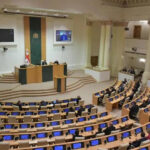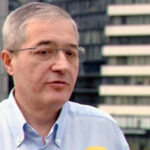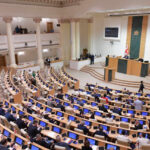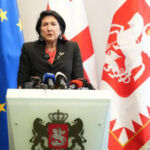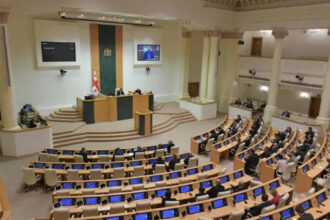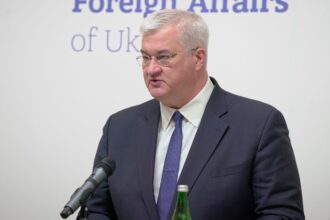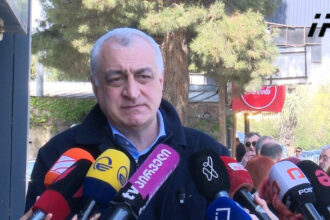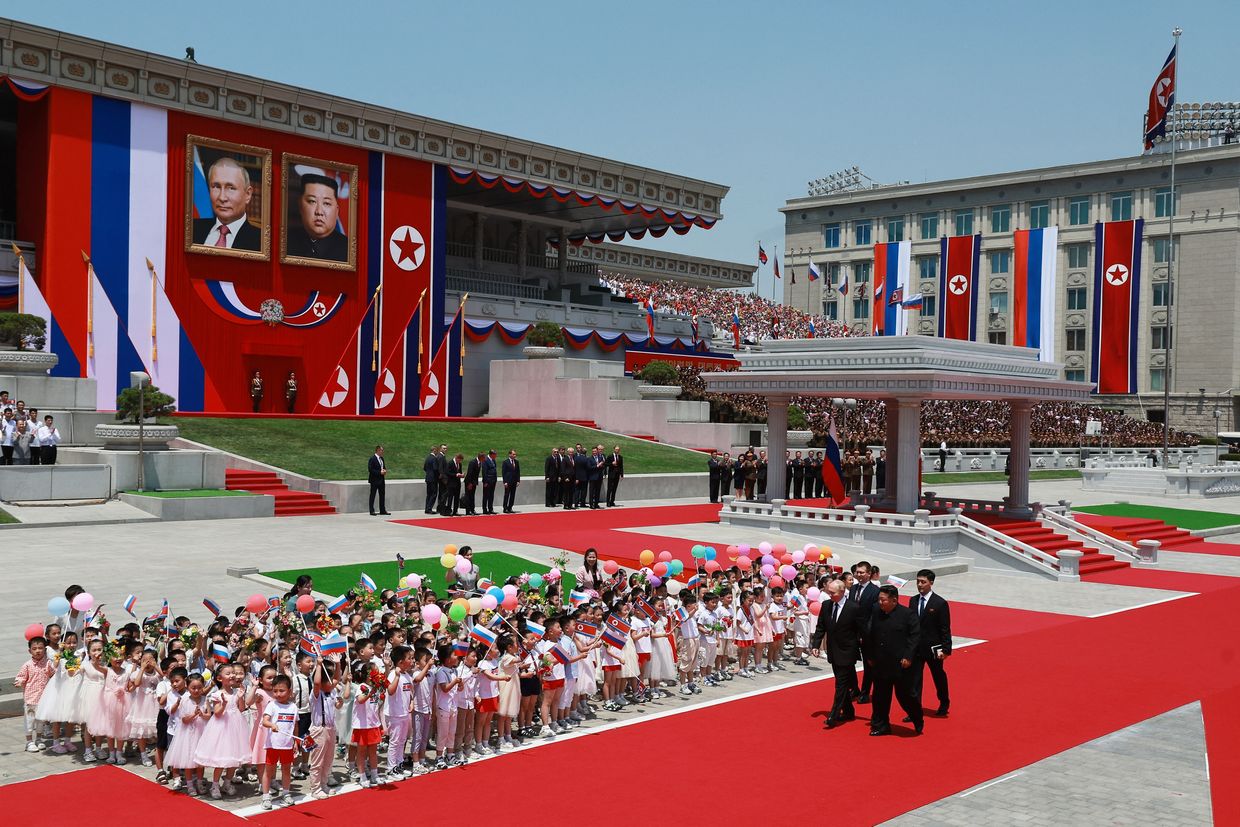(Saul Loeb / AFP via Getty Images) U.S. president Joe Biden addresses the nation in the Rose Garden of Washington, DC on November 7, 2024 after Donald Trump has won the presidential election. (Saul Loeb / AFP through Getty Images).
This week, U.S. president Joe Biden became a “lame-duck,” entering the period of transition between White House administrations, which is traditionally characterized by waning influence and increasing irrelevance. It also involves a lot of administrative preparation for the next administration.
It can also be an opportunity. Unburdened with responsibility and accountability, lame-duck Presidents often take advantage of this time to take actions that they might not have been able to get away with before an elections.
Jessica Berlin, senior fellow at the Center for European Policy Analysis, said in a social media post after the election results were announced that Biden has the opportunity to be the “least-lame duck” in history.
“Anything that can go to Ukraine must go now,” she added.
Donald Trump’s election victory on November 5 has triggered fears of a possible end to U.S. assistance to Ukraine.
Trump’s comments about Ukraine have focused on speedy results rather than long-term support. He has also refrained from saying that he wants Ukraine triumph over Russia.
The transfer of power at the White House is likely to have a huge impact on Ukraine, although no one knows for certain if these consequences will be positive.
It comes at a critical time for the full-scale invasion of Ukraine. Russian forces are making the fastest gains they have made in months, while North Korean troops are in Russia’s Kursk area.
Biden has a number of options, and speculation is already rife about what they might be and how likely it is that they will happen.
The Kyiv Independent reported that “there has been some discussion within the administration about making a gesture towards Ukraine’s NATO Membership, or also about the approval of the use of long range weapons (to strike deeply inside Russia), which the Biden administration had denied until now.” Ambassador Kurt Volker served as the U.S. Special Representative for Ukraine Negotiations in 2017-2019.
The least discussed action Biden can take is perhaps the most important.
Seizing Russian assets
Aaron Gasch Burnett told the Kyiv independent that he would “take the money and do it right now”. He is a fellow and project manager with the Democratic Strategy Initiative in Berlin.
The $300 billion in frozen Russian assets, which have been largely in European banks during the war, is what Burnett is referring.
Only in October of last year did the Group of Seven countries (G7) finally agree on an agreement that would allow the interest they are accumulating to go to Ukraine in the shape of a loan of $50 billion to Kyiv. This loan has yet to be received.
Biden could simply seize the frozen assets in the U.S. and give them to Ukraine, so that it can finance its own war. There are $5 billion in Russian state assets that have been frozen by the U.S.
Burentt said that Biden could do it tomorrow if he wished to, adding that the U.S. Repo Act gave him this power.
“If he wanted, he could declare that these assets were being seized or at least the assets denominated in American dollars, an estimated $16 Billion, possibly even more.”
Burnett said that some European countries, including France and Germany, have resisted this move due to a fear of “retaliation” and “reprisals” from Moscow. The G7 agreement to back loans with interest is a way to appease all sides.
“It is a magic trick that turns $300 billion into $50 billion, because you are too afraid to make the right choice,” he says.
Burnett says that if a Trump administration comes into power, Biden will have a strong case to convince European nations to join in. If Trump cuts aid to Ukraine the financial burden will fall on them. It is better to release a large lump sum of money now than to let interest accumulate over time.
Unsurprisingly, Ukraine has also called for this step.
Heorhii Tikhyi said, “We believe that the U.S. could and should take more measures in this regard in order to use all those frozen assets in full extent to support Ukraine,” in a press conference on Nov. 7, the spokesperson for the Foreign Affairs Ministry.
“You see, you can’t deny that it is fair for Russia to pay for the damage they have caused. It’s also an excellent way to fund the Ukrainian defence with this money.”
This move has another advantage over other options: once Ukraine has the funds, Trump cannot reverse the process once he is in office.
Military aid
On Nov. 7, the Pentagon announced that it would send Ukraine the entire $6 billion outstanding before Trump’s inauguration on Jan. 20, 2019.
Sabrina Singh, Deputy Pentagon Press Secretary, said that Ukraine will receive $4 billion as part of the Presidential Drawdown Authority. This authority pulls weapons out of U.S. stockpiles. The Ukraine Security Assistance Initiative also provides $2 billion.
Singh responded that Washington was “confident”, and could fulfill its commitments towards Kyiv.
“We’re constantly restocking and backfilling our shelves.” “We’re committed in providing Ukraine with what it needs, and that includes the $4 billion in authority,” added she.
The other option that Biden has could have a significant effect on the battlefield. Even if Trump reverses it, the knock-on effects could still be beneficial.
Long-range Strikes
The concerted campaign of Ukrainian President Volodymyr Zelensky to get permission to use Western weapons like the U.S.-made ATACMs or the U.K.’s Storm Shadows in order to strike deep within Russia has failed to date.
In his latest call, he highlighted that Ukraine could target “every camp” where North Korean troops were currently gathering in Russia.
This would be atop some of the airbases that Russia uses to launch missile attacks against Ukrainian cities.
Volker said, “I think that the Biden administration would do well to simply drop its objections.”
“Let Ukraine use the arms we have given them. This can be done in a quiet manner, there is no need to make a big deal. If the Biden administration insists, it can be done case-by-case,” he said.
“But there is no justification to allow Russia to attack Ukraine anywhere and to tell Ukraine they cannot strike back.” If Biden gave the green light, European countries like the U.K. are almost certain to follow suit.
Burnett said that even if Trump reversed his decision upon taking office, it is likely that Ukraine would still be able to obtain permission from the U.K.
He said that it would be a bad look for the Europeans if they were to withdraw their permission along with Trump, if they had already granted it under Biden.
Ukraine is most interested in the last option.
NATO Membership
Biden can take some steps to make it more likely. While immediate NATO membership may not be on the table right now, given the ongoing war, there are still ways to bring this closer to reality.
In September 2022, Kyiv submitted a request to join, and in July 20, 2024, the alliance confirmed Ukraine’s “irreversible journey to full Euro-Atlantic Integration, including NATO Membership.”
But Ukraine still hasn’t received a timeline for when this will occur.
According to a report in the Financial Times last month, Biden could agree to advance Ukraine’s NATO membership application before leaving office in early January. The source was an unnamed Western official.
Volker warned against being too optimistic, even though he did not specify what “the gesture in the direction of Ukraine joining NATO” could be.
“We have to be very, extremely careful about NATO membership. You don’t want that to be announced prematurely. You don’t wish to have it uncoordinated.
“We had the opportunity to do this before the Washington summit last summer, but we didn’t do that.” It does not seem wise to bring this up at the end of the Biden Administration. It needs to be coordinated better.”
Burnett says that while the options and chances of Biden’s success vary, they all share one thing.
He said, “I can’t think of anything Biden could possibly do in the next two months that he hasn’t already done.”
“That’s a fair assessment.”
Chris York is the news editor of the Kyiv Independent. He was the head of news for the Kyiv Post before joining the team. He spent almost a decade in Britain working for HuffPost UK. He holds a MA in Conflict, Development, and Security, from the University of Leeds.
Read More @ kyivindependent.com
